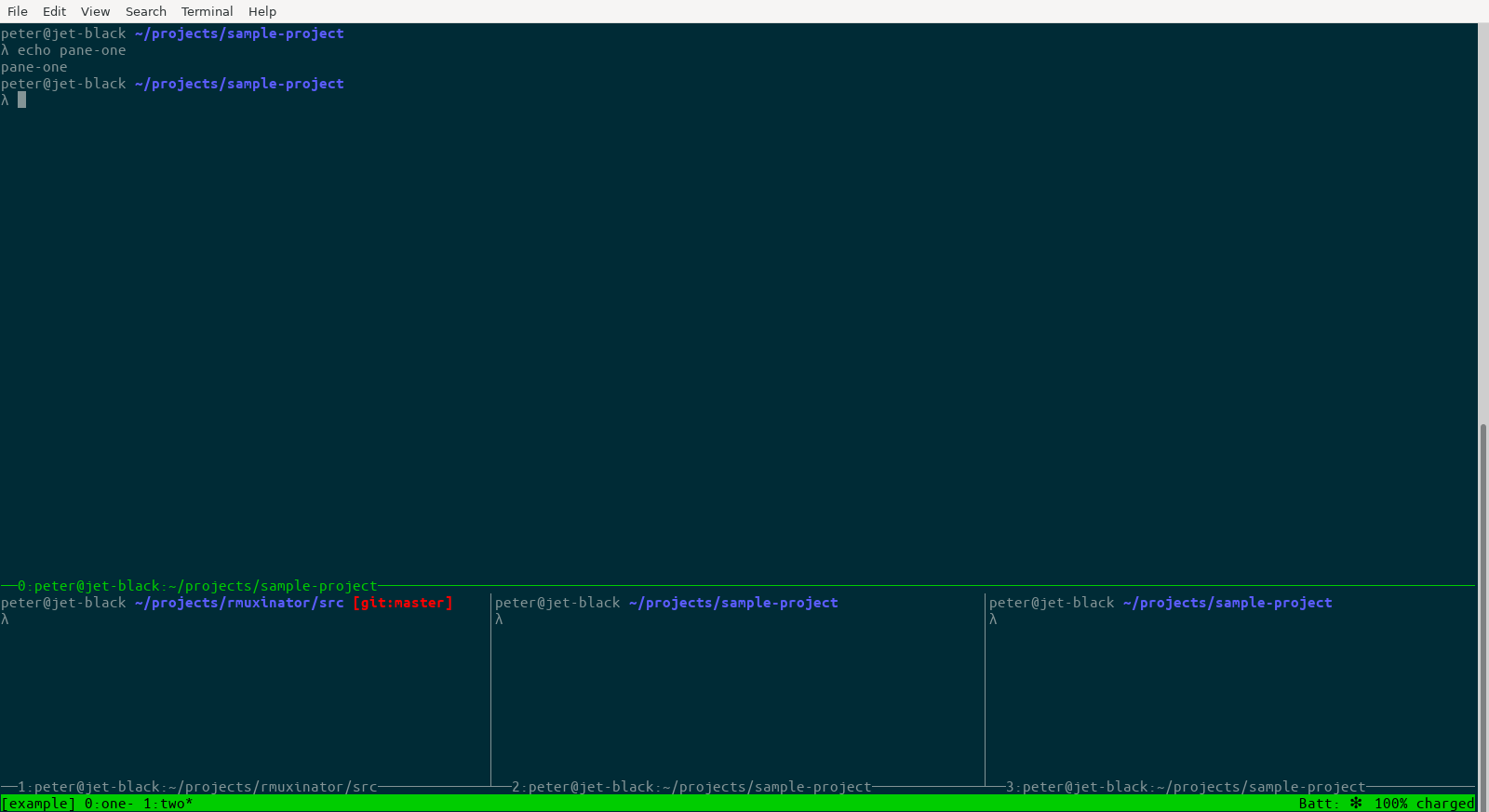This project aims to be a successor to tmuxinator, which allows users to define tmux project profiles (e.g. open two windows, split each into three panes and run a series of commands in each). It is written in Rust and will be more dependable (config is typechecked where possible) and simpler to install. It's also a great excuse for me to learn more about Rust, its ecosystem and compiling/distributing binaries for various platforms.
- install tmux (>= 2.8), rust and cargo
- build and run with:
cargo build && ./target/debug/rmuxinator start Example.toml
Projects are defined using toml.
For example:
layout = "main-horizontal"
name = "example"
pane_name_user_option = "custom_pane_title"
start_directory = "/home/peter/projects/vim"
[[hooks]]
command = "run-shell \"tmux display-message 'Hi from pane-focus-in hook!'\""
name = "pane-focus-in"
[[windows]]
layout = "tiled"
name = "one"
start_directory = "/home/peter/projects/sample-project"
[[windows.panes]]
commands = ["echo pane-one"]
name = "Work"
[[windows.panes]]
commands = ["echo pane-two"]
name = "Music"
start_directory = "/home/peter/projects/rmuxinator/src"
[[windows.panes]]
commands = ["echo pane-three"]
name = "RSS"
[[windows.panes]]
commands = ["echo hi one", "echo intermediate one", "echo bye one"]
[[windows]]
name = "two"
start_directory = "/home/peter/projects/sample-project"
[[windows.panes]]
commands = ["echo pane-one"]
[[windows.panes]]
commands = ["echo pane-two"]
start_directory = "/home/peter/projects/rmuxinator/src"
[[windows.panes]]
commands = ["echo pane-three"]
[[windows.panes]]
commands = ["echo hi one", "echo intermediate one", "echo bye one"]
Optional attributes will be noted below.
name(string)windows(array; see dedicated entry)
hooks(array; see dedicated entry)layout(string; preset tmux layouts: "even-horizontal", "even-vertical", "main-horizontal", "main-vertical", "tiled")pane_name_user_option(string; must have matching entry in .tmux.conf (e.g.set -g pane-border-format "#{@custom_pane_title}")start_directory(string)
command(string; must use tmux'srun_shell; see tmux docs)name(string; must match existing tmux hook (e.g.after-select-pane); see tmux docs)
panes(array; see dedicated entry)
layout(string; preset tmux layouts: "even-horizontal", "even-vertical", "main-horizontal", "main-vertical", "tiled")name(string)start_directory(string)
commands(array of strings)
name(string)start_directory(string)
Print the tmux commands that would be used to start and configure a tmux
session using a path to a project config file:
rmuxinator debug Example.toml
Start a tmux session using a path to a project config file:
rmuxinator start Example.toml
rmuxinator currently assumes that both base-index and pane-base-index are
0. This will be handled programatically in a future release, but for the time
being, it can be worked around by either removing overrides from .tmux.conf or
by adding the following:
set -g base-index 0
set -g pane-base-index 0
This project is currently a proof of concept and I'll be duplicating tmuxinator features and adding additional improvements as I can find time. Right now, it's capable of:
- parsing a TOML project config file
- starting a named tmux session
- setting a default layout for project windows
- setting the default working directory
- creating windows
- setting cwd for windows
- setting window layout
- creating panes
- setting cwd for panes
- setting a pane title using a "user option" (requires >= tmux 3.0a and related pane-border-format config option)
- running pane commands
- wiring up optional tmux event hooks/callbacks
- Consider building up and executing a single script (a la tmuxinator) instead of shelling out many times
- Support custom layouts?
- Break lib into component files (Config, CliArgs, etc.)
- Do we need custom hooks, like tmuxinator uses for pre_window, project_start, etc.? I was hoping to leverage tmux's hooks and save the trouble, but the mapping is not 1:1 and users could have to result to hacks like having hooks remove themselves in order to prevent duplicate events.
- CliArgs.project_name should change to reflect that it's a file path
- Looks like format doesn't consume values, so refs aren't (always?) necessary
- Use feature detection to conditionally apply/opt out of certain features (user options)
- Integration tests which verify compound/derived values (e.g. start_directory)
- Integration tests which verify calls to tmux?
- Handle shell failures --
tmux kill-windowwas failing silently - Can commands can all be moved into structs and computed up front? This might require writing a custom Serde deserializer for the Config type.
- Select window on attach (can this be handled by a pre-existing hook?)
- Attach if session exists instead of creating sesssion
- Search for project config file on disk (XDG_CONFIG?) instead of parsing config (I'm not convinced this is necessary)
- Other CLI commands? (stop session, create/edit/delete project)
- Use named args in calls to format! where possible
- Cut v0.0.1 release and publish binaries
Here are the platforms rmuxinator is known to work on:
- x86_64 GNU/Linux
- x86_64 GNU/Linux (Windows Subshell)
- armv6l GNU/Linux (RPi Zero; I was able to successfully cross-compile from Debian x86_64 => armv6l using the arm-linux-gnueabihf linker provided in the raspberrypi/tools repository. The Debian package did not work; I was able to compile successfully, but the program segfaulted immediately when executed.)
- https://github.com/raspberrypi/tools
- https://old.reddit.com/r/rust/comments/9io0z8/run_crosscompiled_code_on_rpi_0/
- https://medium.com/@wizofe/cross-compiling-rust-for-arm-e-g-raspberry-pi-using-any-os-11711ebfc52b
- https://devel.tech/tips/n/tMuXz2lj/the-power-of-tmux-hooks/
- https://rust-cli.github.io/book/tutorial/testing.html
